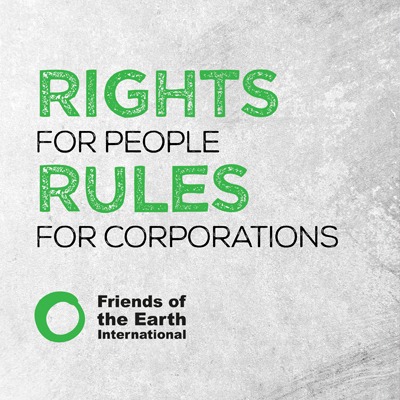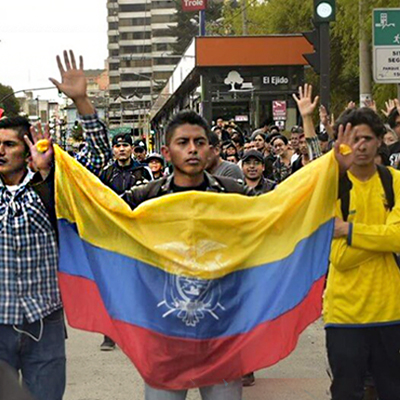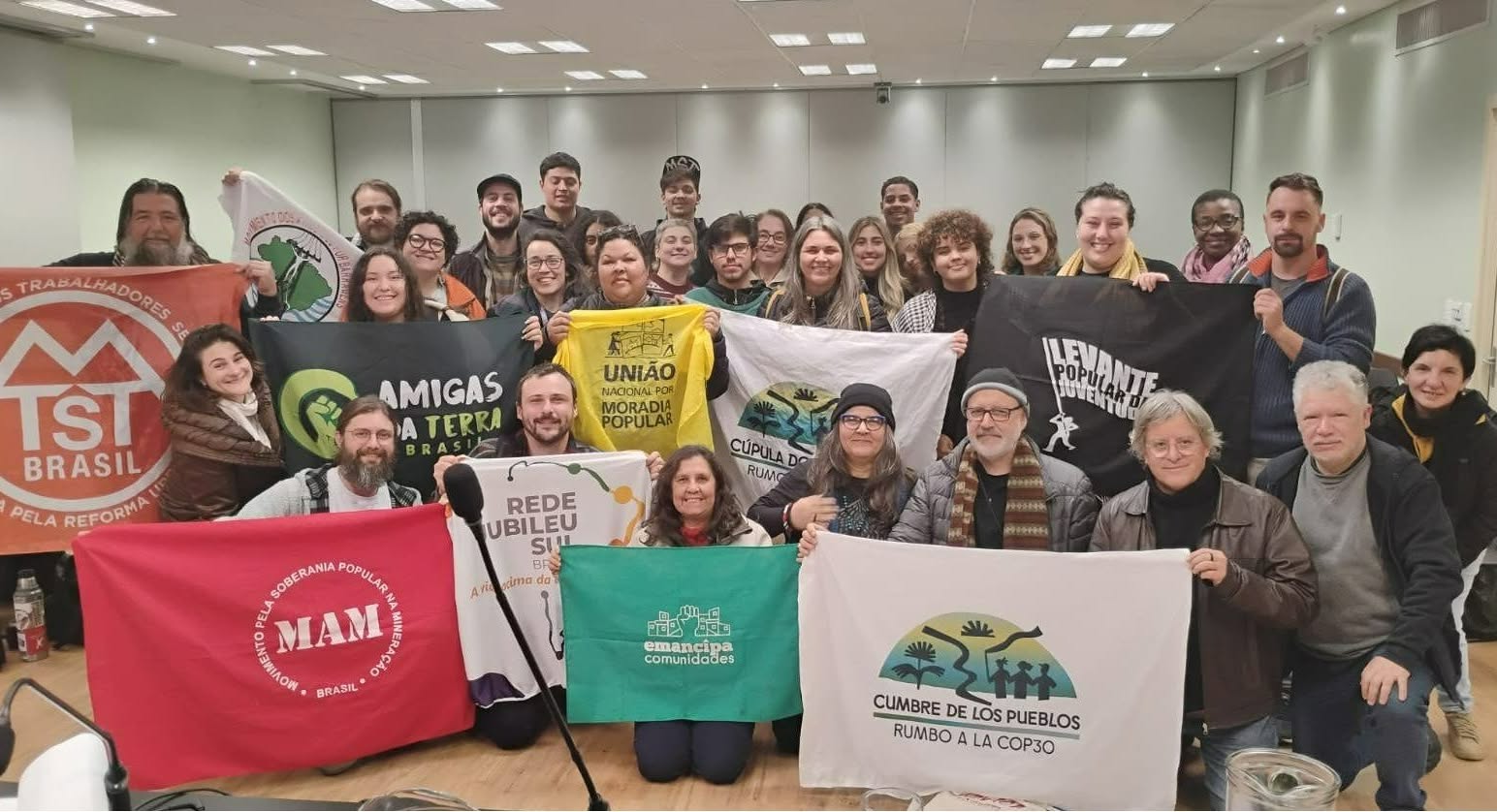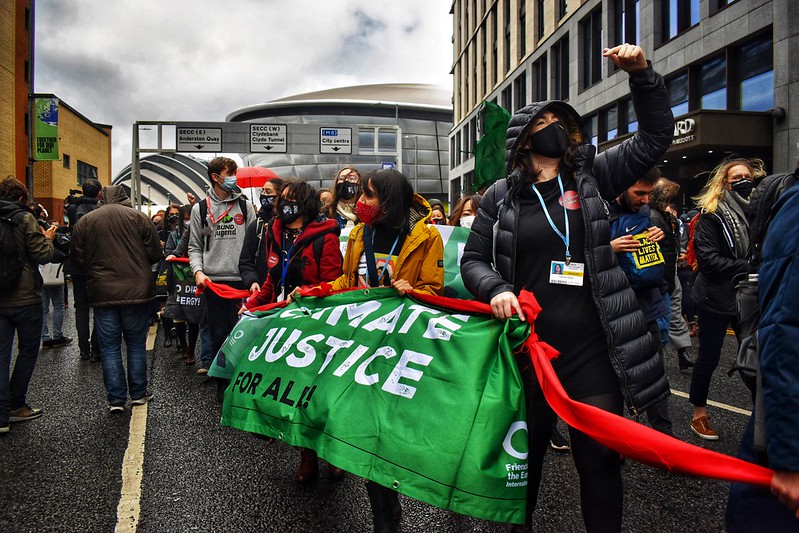The fight to establish the primacy of human rights and binding rules for corporations
Specialists question the third draft of the Binding Treaty on transnational corporations and human rights.
 Friends of the Earth International.
Friends of the Earth International.
On 17 August 2021, the third revised draft of the Binding Treaty on human rights and transnational corporations was published- as part of the seven years of negotiations at the United Nations. As the negotiations develop and new drafts are presented, what has been agreed is becoming further removed from the demands of civil society. This latest draft is no exception.
“The fight is to establish the primacy of human rights,” said Manoela Roland, doctor of Public International Law, in her speech at a recent regional discussion “Never going back to the old normality again: rights for the peoples, rules for corporations,” on 20 August. Present at the meeting were representatives from various organisations and social movements of the Global Campaign to Dismantle Corporate Power and Stop Impunity, which is pressing for the Binding Treaty.
Roland, coordinator of the Human Rights and Business Centre (HOMA), in analysing the third draft, referred to the primacy of the lex mercatoria in the treaty; that is, the market law of medieval Europe.
“[This prevalence] is even reproduced in language; abuse, risks, impacts are used when speaking of the violation of human rights by corporations, in order to reproduce the idea that we must accept this type of planning or functionality that includes violations of human rights as a cost of development,” Roland said.
One of the criticisms from social organisations to the text modifications is the change of the term “transnational corporations” to “corporations” in general. This is even far removed from resolution 26/9 (2014), which gave rise to these negotiations. HOMA’s coordinator went further in the criticism of the new text: “It establishes that there is a differentiated treatment for small and medium-sized corporations, and that perspective can be established both in terms of the size of businesses and in the level of impact and violation of human rights. In other words, a medium-sized corporation that causes a major violation may not be held liable.”
According to Roland “this is another trap,” and it is not the only one. Paragraph 11 of the third draft establishes how the obligations of corporations will be related to human rights. There is said to be an obligation to “prevent and mitigate” human rights violations. “Thus, there is a principle here whereby corporations can still violate human rights, because they only have to mitigate” those violations. “We can interpret this principle as corporations having more rights than people, since people cannot mitigate human rights violations, and neither can states.”
Finally, Roland called attention to the state-centric orientation of the draft text. This creates a dependency on state actions that become dangerous in times of corporate capture, taking into account that Southern states are very flexible in lowering their standards for the protection of human rights in an attempt to attract international investment. Corporate capture is part of the architecture of impunity referred to by Pablo Fajardo, who also participated in the discussion.
The construction of impunity
Fajardo is a delegate and advisor to the Union of People Affected by Texaco (UDAPT) in Ecuador. In his presentation, he referenced the Chevron case (formerly Texaco), in which six indigenous people have been seeking justice for 27 years across the world with no success so far, despite four successful convictions against the corporation in Ecuador. In Fajardo’s words, “sometimes the problem is not in winning a trial, it is in how you manage to execute that sentence; in that execution, we have found a real architecture of impunity that is guaranteed to transnational corporations.”
The Binding Treaty should disarm the architecture of impunity that, according to Fajardo, consists of several elements. On the one hand, the states of origin of the transnationals often protect these corporations by issuing judicial decisions that prohibit executing sentences against the corporations in their country. On the other hand, transnationals’ legal structures include holding companies or subsidiary companies. In the case of Chevron, it has more than 70 legally independent and autonomous corporations for which it is not responsible.
According to Fajardo, there is also a clear economic asymmetry between affected peoples and transnational corporations, which translates into an asymmetry of legal tools. There are also media campaigns of criminalisation against the peoples who are fighting those corporations. And finally, the UDAPT lawyer pointed out that indigenous and peasant peoples have only declarations in the UN, while the economic power has the protection of legally binding instruments and agreements.
With these key points on the table, Fajardo’s demand is clear: in order to ensure that the Binding Treaty is not an empty instrument, it must “include the lifting of the corporate veil; the direct responsibility of the transnationals with all their subsidiaries in the value chain; set clear rules in that economic asymmetry between the affected peoples and the transnational corporations; and regulate a justice system – be it a court or tribunal – so that these peoples have the full right to sue the criminal corporation.”
Due diligence
A human rights due diligence process to identify, prevent, mitigate and account for how corporations address their human rights impacts is not enough. The secretary for sustainable policy of the Trade Union Confederation of the Americas, Bárbara Figueroa, also a speaker in the discussion, mentioned due diligence as a possible instrument to settle social demands.
“In our opinion, due diligence does not constitute an obligation of direct compliance with the rights of the people who work,” said Figueroa. She continued: “If disrespect towards fundamental labour and human rights in general is widely denounced within a region [without consequences for corporations], what makes us think that due diligence could be a satisfactory alternative? Who benefits from driving due diligence or not in this context? In this framework, the main task and the commitment that we have to assume from the trade union world of the region is moving forward and reaching a legally binding Treaty on corporations and human rights.”
Along these lines, Roland criticised the discourse that promotes due diligence by corporations in which human rights violations can be resolved at the national level, without the need for an international Binding Treaty. The Brazilian specialist reinforced the questions raised by Figueroa: “Is the promotion of due diligence a coincidence, or is it because they know that these [Binding Treaty] laws are less ambitious?”
“You cannot negotiate human rights; you have to guarantee them.”
This was stated by another of the participants of the discussion, Tchenna Maso, lawyer of the Movement of People Affected by Dams of Brazil (MAB), and HOMA researcher, who spoke about the political subject of this struggle: communities affected by human rights violations. “The problem [in the Binding Treaty negotiations] is the idea that everyone is a party. They put transnational corporations, which are only interested in profits, in the same legitimacy space as us, who represent much more.”
Regarding the situation in Brazil, Maso emphasised the need for this Binding Treaty to generate “guarantees of non-repetition” and brought as an example the case of Vale and its systematic environmental crimes. The rupture of its dam in Mariana (state of Minas Gerais) in 2015 killed 20 people, and in 2019 the case of Brumadinho (also in Minas Gerais) took the lives of 250 people. Maso spoke of the reversal of the burden of proof: “as the affected people, we cannot prove our damages. They have destroyed our home and work. How are we going to prove what we had?”
Letícia Paranhos, from Friends of the Earth Latin America and the Caribbean (ATALC), presented the historic victory in the court of The Hague (Netherlands) against the Shell corporation. In this case, a transnational corporation was held directly responsible for its part in climate change in the field of international law and was sentenced to reduce its CO2 net emissions by 45 percent. In addition to the sentence, Paranhos highlighted “a very powerful articulation of the movements who made a lot of noise around the world, and were even able to break the media bubble, thanks to the convergence of the communication of social movements.”
Although Shell has already made its appeal, “the fighting process and the verdict against the corporation has shown that corporations are not untouchable, and we are going for more. We are going for a Binding Treaty to dismantle corporate power,” said Paranhos, and concluded: “Our fight is for system change.”






